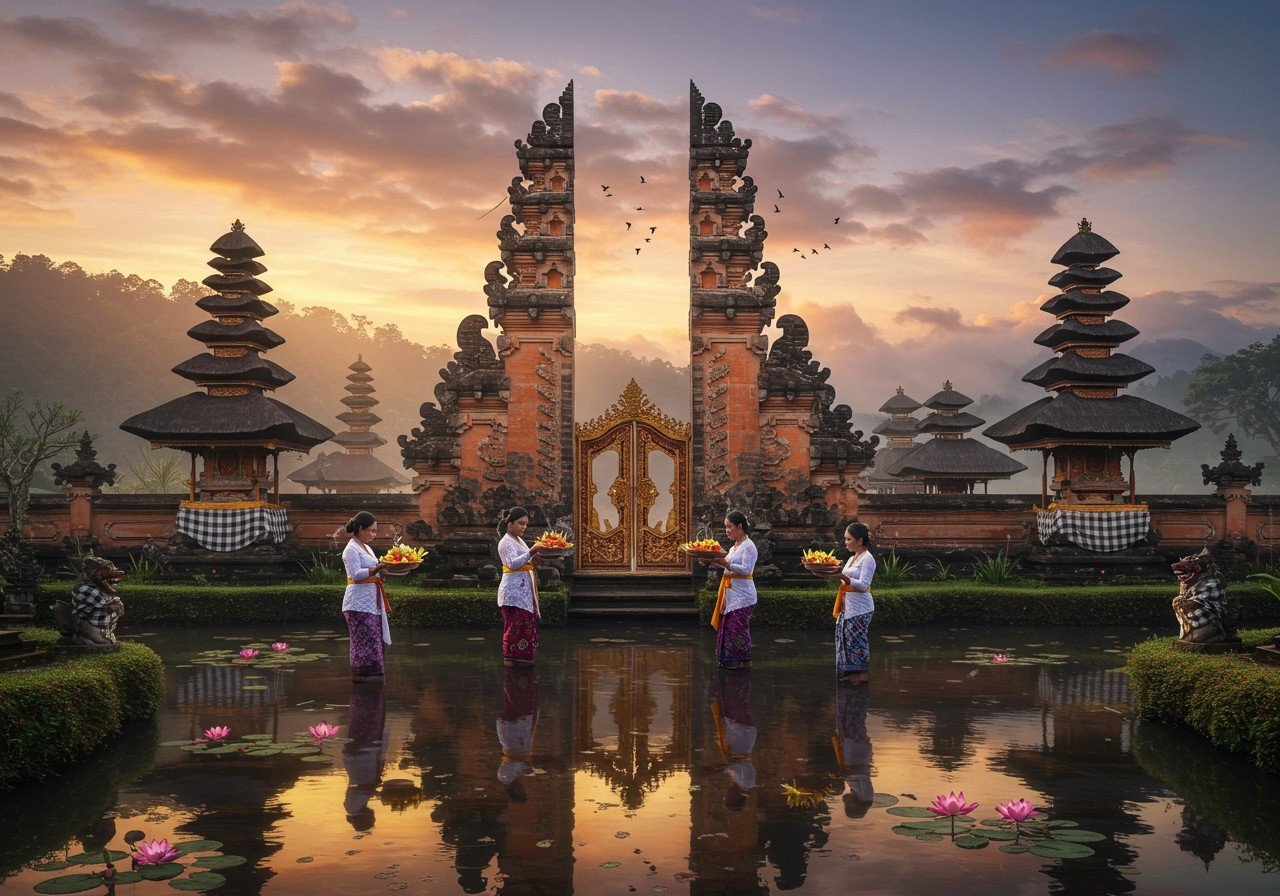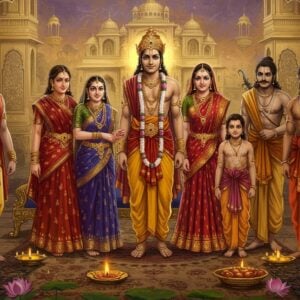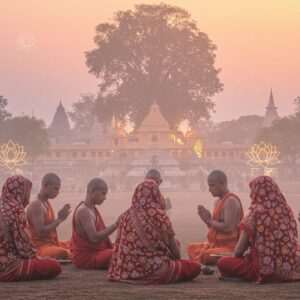
Immerse yourself in the vibrant tapestry of Balinese Hinduism, locally known as Agama Hindu Dharma. This captivating faith beautifully blends traditional Hindu practices with the rich cultural heritage of Bali. It emphasizes a deep connection with nature and the importance of community, setting it apart from its Indian counterpart. Join us as we explore the profound significance of Balinese Hindu rituals and their seamless integration into everyday life on the island.
Balinese Hinduism: A Spiritual Odyssey
Balinese Hinduism pulsates at the heart of Bali’s spiritual life. It’s a captivating fusion of Indian Hinduism, indigenous animistic beliefs, reverence for ancestors, and subtle Buddhist influences. This unique spiritual cocktail has simmered and evolved over centuries, shaping the island’s distinct culture and the rhythm of daily life.
Core Beliefs: The Foundation of Balinese Hinduism
At the core of Balinese Hinduism lies the belief in one supreme being, Sang Hyang Widhi Wasa, also known as Acintya or Sang Hyang Tunggal. Think of it like this: all other gods and goddesses are simply different expressions of this single, ultimate divine source.
The Trimurti—Brahma (the creator), Vishnu (the preserver), and Shiva (the destroyer)—hold a significant place, much like in other Hindu traditions. Alongside them, local deities and spirits, known as Hyang, dwell in the natural world—mountains, trees, rivers—all imbued with spiritual significance. This reverence for the natural world reflects the important principle of Tri Hita Karana, emphasizing the essential harmony between humanity, nature, and the divine. It’s all about balance, you see.
Karma and reincarnation form the bedrock of Balinese Hindu belief. Life is viewed as a continuous cycle of birth, death, and rebirth, a journey shaped by our actions. Ancestor worship holds a special place too. Balinese Hindus believe that the spirits of their ancestors remain present, acting as a bridge between the human and spiritual realms. Offerings and ceremonies are performed to honor these ancestral connections.
Rituals and Practices: The Heart of Daily Life
Daily offerings, known as banten, are woven into the fabric of Balinese life. These small, woven palm-leaf trays, particularly the Canang Sari, are gestures of gratitude and devotion. They are placed everywhere—homes, temples, and other sacred places—as a way of connecting with the divine.
Temples, or Pura, are essential to Balinese Hinduism. They vary from grand public complexes to small, intimate shrines nestled within homes and gardens. Festivals, vibrant explosions of color and tradition, are an integral part of the spiritual calendar. Nyepi, the Balinese New Year, is a day of profound silence and meditation. Galungan celebrates the triumph of dharma (good) over adharma (evil). Saraswati honors knowledge and learning.
Life-cycle rituals mark important milestones, ceremonies performed to purify the soul and appease potentially malevolent spirits. Babies are considered especially divine for the first 42 days of life, not even allowed to touch the ground during this sacred period.
Pemangku, the Hindu priests, are the keepers of these sacred traditions. They preside over ceremonies, care for shrines and temples, and guide the community in their spiritual practices.
Key Differences: Setting Balinese Hinduism Apart
While sharing roots with Indian Hinduism, Balinese Hinduism has its own distinct flavor. It places a greater emphasis on local deities and spirits, weaving them into the very fabric of daily life. Worship isn’t confined to temples and priests; it’s an integral part of everyday routines.
Even the architecture of Balinese temples has its own unique style, different from what you’d see in India. Animistic beliefs, the idea that all natural things possess a soul, are more prominent. And importantly, while social hierarchies exist, the formal caste system found in Indian Hinduism isn’t a part of Balinese religious practice.
Deepening Your Understanding of Balinese Hinduism
For those eager to learn more, Ubud, the cultural heart of Bali, offers a wealth of courses and experiences focused on Balinese culture and religion. Imagine immersing yourself in the rhythm of village life, staying with a local family for the full 210-day Balinese calendar cycle. This would offer a truly profound understanding of the daily ceremonies and religious practices.
Highly recommended reads include Bali: Sekala & Niskala by Fred B. Eiseman Jr. for a deeper dive into the seen and unseen realms of Balinese culture and Hinduism in Bali: Families and their Faiths by Angela Hobart to understand the interplay of family and faith. Online resources like BaliSpirit.com also offer valuable insights.
Poojn.in: Your Companion on Your Spiritual Journey
At poojn.in, we understand the importance of having the right resources for your spiritual practices. As India’s leading provider of puja items, we offer a wide selection of authentic products perfectly suited for Balinese Hindu rituals and ceremonies. Whether you’re seeking traditional incense like dhoop, sacred threads for deity adornment, or pure brass bells, we have everything you need to create a sacred space and honor your chosen deities. Explore our collection of ritual items today.
Our dedicated team can guide you in selecting the most appropriate items for specific ceremonies and rituals. Reach us at 03369029784 or via WhatsApp at 9476142738.
We ensure quality, authenticity, and secure packaging for all our products, delivering them safely to your doorstep across India. Visit www.poojn.in to explore our comprehensive range.
Embracing the Essence of Balinese Hinduism
Balinese Hinduism offers a unique lens through which to view the spiritual world, a place where ancient traditions and modern life intertwine. From the simple daily offering of Canang Sari to the grand celebrations of festivals, it speaks to the importance of expressing gratitude and reverence for the divine and the natural world.
As you delve into the heart of this faith, remember the core principle of Tri Hita Karana—striving for balance and harmony between the divine, humanity, and the environment. The wisdom of Balinese Hinduism enriches not only those who practice it, but also fosters a deeper appreciation for the tapestry of spiritual traditions around the globe.
FAQs: Your Questions Answered
What distinguishes the main deities in Balinese Hinduism? Balinese Hinduism reveres a rich array of deities. Prominent figures include Brahma, Vishnu, and Shiva, forming the revered Hindu trinity. Alongside them, local deities and revered ancestors hold significant sway in daily practices, creating a unique spiritual landscape.
What sets Balinese Hinduism apart from its Indian counterpart? Balinese Hinduism blends Hindu beliefs with indigenous Balinese customs, resulting in a unique expression of faith. Both traditions share core deities, yet the rituals and practices in Bali reflect its distinct culture. This creates a vibrant mix of the familiar and the uniquely Balinese.
Which rituals are commonly observed in Balinese Hinduism? Daily offerings called “canang sari,” vibrant temple ceremonies, and grand festivals like Galungan and Nyepi are integral parts of Balinese Hindu life. These rituals nurture harmony between the gods, humanity, and the natural world.
What makes offerings so important in Balinese Hinduism? Offerings are expressions of deep gratitude to the gods and spirits. They are seen as a way to maintain balance and harmony, inviting blessings and protection for families and communities. It’s a way of reciprocating the divine’s benevolence.
What role do temples play in Balinese Hinduism? Temples are sacred spaces where the community gathers to worship and connect with the divine. They serve as the focal point for rituals and ceremonies, acting as a bridge between the physical and spiritual realms. They are places of power and connection.
How do Balinese Hindus integrate their faith into daily routines? Balinese Hindus seamlessly weave spiritual practices into their lives through offerings, prayers, and the upkeep of temple spaces. This constant connection nurtures reverence for deities and ancestors, keeping the spiritual alive in the everyday.
What are the core beliefs underpinning Balinese Hinduism? Balance and harmony are at the very heart of Balinese Hinduism, emphasizing equilibrium between the spiritual and physical dimensions. Karma and Dharma, fundamental principles of Hinduism, guide actions and responsibilities in daily life.


